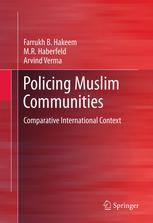

Most ebook files are in PDF format, so you can easily read them using various software such as Foxit Reader or directly on the Google Chrome browser.
Some ebook files are released by publishers in other formats such as .awz, .mobi, .epub, .fb2, etc. You may need to install specific software to read these formats on mobile/PC, such as Calibre.
Please read the tutorial at this link: https://ebookbell.com/faq
We offer FREE conversion to the popular formats you request; however, this may take some time. Therefore, right after payment, please email us, and we will try to provide the service as quickly as possible.
For some exceptional file formats or broken links (if any), please refrain from opening any disputes. Instead, email us first, and we will try to assist within a maximum of 6 hours.
EbookBell Team

4.8
104 reviewsIn the past two decades, Muslim countries across the globe have been faced with a crisis in governance. Starting with a summary of Islamic Law (Sharia) and its implications for law enforcement, this book will highlight the unique needs and challenges of law enforcement, and particularly policing, in these communities. It will provide a scholarly exposition of Sharia law and how it is compatible (or not) with policing in a modern context. The role and contribution of Sharia Law towards conceptualizing law enforcement in a modern context is certainly worth looking forward to, especially understanding its co-existence with civil law in countries with minority Muslim communities. Featuring case studies from throughout the Muslim world, this volume will highlight key qualities of Sharia law and Muslim culture that play a role in law enforcement, including: case processing, community policing, police administration, human rights, and the influence of globalization. Taking a comprehensive approach, this work provides a historical context for colonization events in Muslim countries and their influence on current law enforcement systems, as well as providing key insights into the particular norms that make up the bases for Muslim societies, and their unique needs. Looking into the future, it provides guidelines for how community policing can play a proactive role in law enforcement and crime prevention.